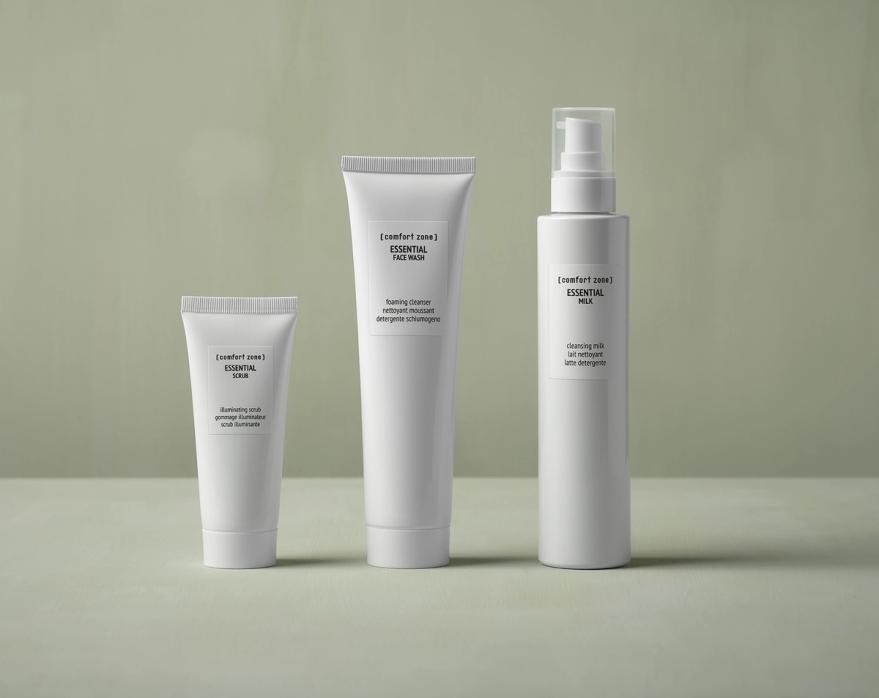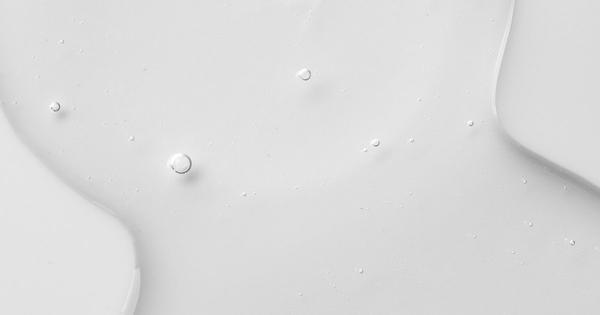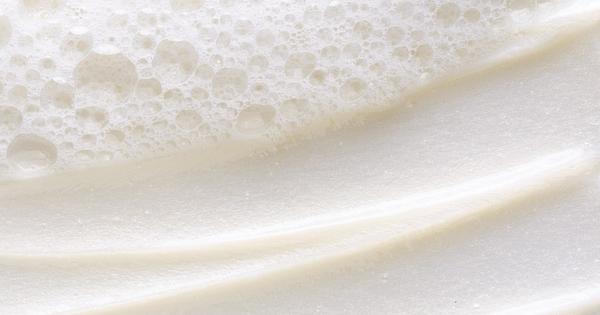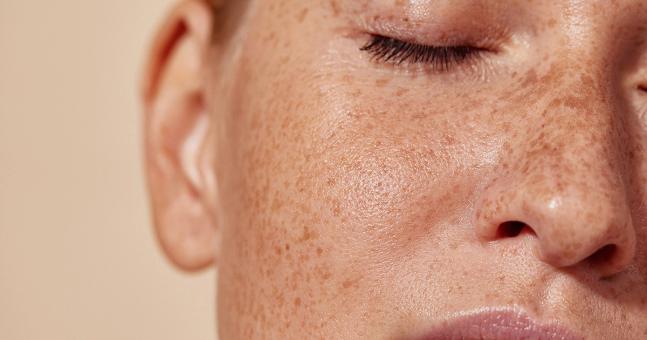Essential Face Wash
Gentle foaming cleanser
skin care
Maria Giulia Simonazzi | International Training Manager
10 min read

Having radiant and healthy skin is a goal for many of us. To achieve this goal, establishing a perfect face wash routine is an essential step. However, it is often the step that is most looked over. Washing your face is very important, and it’s not just about removing dirt and makeup—it’s about caring for your skin.
Your face is exposed to various environmental factors such as pollution, UV rays, and bacteria throughout the day. Additionally, your skin produces oil, sweat, and dead skin cells, which can clog pores and lead to breakouts. Regularly washing your face helps to eliminate these impurities, keeping your skin clean and preventing potential skin concerns.
In this guide, we will be diving into the essential components of washing your face. From understanding your skin type to knowing which skincare products to choose or avoid, you’ll have all the tips you need for building your perfect face wash routine.
"Proper cleansing is truly the foundational action for healthy, happy skin. From pollution particles to sunscreen and make-up, to the many times we touch our face during the day, it's vital that we never skip this step."
Elisabeth Nehme - Global Brand Ambassador Comfort Zone
When it comes to achieving healthy and glowing skin, one size does not fit all. Every individual has a unique skin type, and understanding yours is essential for developing an effective skincare routine.
Whether you have oily, dry, sensitive, combination, or normal skin, identifying your skin type will guide you in finding a face wash that addresses your specific needs. Below is an explanation of each skin type and how to identify your own:
Oily skin is characterized by an overproduction of sebum, resulting in a shiny and greasy complexion. People with oily skin often experience enlarged pores, frequent breakouts, and a tendency for their makeup to slide off throughout the day.
Dry skin lacks moisture and can feel tight, rough, or flaky. It is often sensitive and prone to irritation. Those with dry skin may notice fine lines and a dull complexion.
Sensitive skin is prone to react negatively to certain ingredients or environmental factors, resulting in redness, itching, or irritation. It is important to choose sensitive skin products that will help protect the skin barrier.
Considered the ideal skin type, normal skin is well-balanced, neither too oily nor too dry. It has a smooth texture, small pores, and a healthy complexion.
In order to build our perfect skincare routine, we must first choose the right face wash. The face wash you use plays a crucial role in removing impurities, unclogging pores, and maintaining the overall health of your skin. Dermatologist Dr. Kathleen Cook Suozzi, MD, sums up the most important quality of a face wash in one word: gentle. Understanding your skin type and knowing which ingredients to look for or avoid will help the decision-making process easier.
Effective for oily and acne-prone skin, salicylic acid helps unclog pores, reduce inflammation, and control excess oil production. It is an exfoliant that supports the natural shedding of dead skin cells to reveal a healthier, brighter complexion.
Ideal for dry or dehydrated skin, hyaluronic acid attracts and retains moisture, providing deep hydration and improving skin elasticity.
Known for its soothing and hydrating effects, aloe vera is beneficial for sensitive or irritated skin, reducing redness, and promoting healing. It also contains antimicrobial properties that diminish age lines and blemishes.
Suitable for most skin types, glycolic acid exfoliates and brightens the skin, helping to even out skin tone and texture. Due to its small size, glycolic acid can easily penetrate the skin, boosting collagen production and supporting skin moisture.
Known for its antimicrobial properties, tea tree oil is beneficial for oily and acne-prone skin, helping to reduce blemishes and control breakouts.
While you may be tempted to make a purchase based on the scent, it is important to understand that artificial fragrances can be irritating and trigger allergic reactions. They can even dry out the skin with consistent use. Opt for fragrance-free or naturally scented face washes.
Sodium Lauryl Sulfate (SLS) is a common ingredient used to create a foam when washing your face. However, it is also a harsh surfactant that can strip the skin of its natural oils, leading to dryness and irritation. Look for sulfate-free options.
Alcohols are often used to make a product feel weightless, but they can be very damaging to the skin’s barrier function. Seek alcohol-free alternatives, especially if you have dry or sensitive skin.

Gel cleansers are lightweight and have a gel-like consistency. They are generally suitable for oily and acne-prone skin types. They provide a refreshing and cooling sensation, leaving the skin feeling clean and refreshed.
Foam cleansers start as a liquid and transform into a foamy lather when dispensed. They are suitable for various skin types, depending on the formulation. They provide a deep cleanse, making them suitable for combination or oily skin.
Cream cleansers have a creamy and rich texture. They are formulated to provide hydration and are ideal for dry or sensitive skin types.
Oil cleansers are formulated with oils, such as argan oil, jojoba oil, or coconut oil. Contrary to what one might expect, oil cleansers are suitable for all skin types, including oily and acne-prone skin. Take a look at these two oil cleansers from Comfort Zone: Remedy Cream to Oil and the Pro Skin Barrier Cleanser.
Exfoliating cleansers contain gentle exfoliating agents, such as microbeads, fruit enzymes, or alpha-hydroxy acids (AHAs) like glycolic acid or lactic acid. These cleansers are suitable for all skin types, depending on the frequency of use and the intensity of exfoliation.
pH-balanced cleansers are formulated to match the skin's natural pH level, which is slightly acidic. pH-balanced cleansers are suitable for all skin types and can help prevent dryness, irritation, and disruption to the skin's natural ecosystem.
A perfect face wash routine is a cornerstone of a healthy skincare regimen. It involves a series of steps that work together to cleanse, treat, moisturize, and protect your skin. By establishing a consistent and personalized routine, you can effectively address your skin's specific needs and achieve a complexion that is balanced and nourished.
Before applying your face wash, it's important to prepare your skin. Start by washing your hands thoroughly to ensure they are clean. This step allows your face wash to work more effectively by directly targeting your skin.
Using the appropriate face wash for your skin type, apply a small amount to your damp face and gently massage it in circular motions. Focus on areas prone to oiliness, congestion, or buildup, such as the forehead, nose, and chin.
After cleansing, consider incorporating targeted treatments into your routine. These treatments can address specific skin concerns, such as acne, hyperpigmentation, or aging.
Moisturizing is a crucial step in any face wash routine, regardless of your skin type. It helps replenish moisture, lock in active ingredients, strengthen the skin's barrier, and maintain its overall health and elasticity.
The final step in your face wash routine is to protect your skin from the harmful effects of the sun's UV rays. Apply a broad-spectrum sunscreen with an SPF of 30 or higher, even if you're indoors or the weather is cloudy.

While genetics and lifestyle certainly play a role, taking care of your skin through a consistent and mindful skincare routine can significantly contribute to a glowing complexion. These tips will help you build a skincare routine that can lead to a smooth, radiant, and youthful complexion.
Cleansing your skin twice a day is important. Once in the morning and once in the evening to remove dirt, oil, and impurities that can accumulate throughout the day.
Exfoliation is an essential step to remove dead skin cells, unclog pores, and promote a smooth and youthful complexion. Aim to exfoliate 1-2 times a week to maintain a healthy glow.
Hydration is key. Drink an adequate amount of water daily to keep your skin hydrated from within. When taking a shower, opt for lukewarm water over hot, as hot showers and baths can dry out the skin. Additionally, use a moisturizer suitable for your skin type to lock in moisture and prevent dryness.
Protecting your skin from harmful UV rays is crucial for bright and vibrant skin. Apply broad-spectrum sunscreen with an SPF of 30 or higher daily, even on cloudy days. Sunscreen helps prevent premature aging, sunspots, and other sun-related damage.
It is important to note that your diet can impact the health and radiance of your skin. Incorporate a well-balanced diet rich in fruits, vegetables, whole grains, lean proteins, and healthy fats. Avoid excessive consumption of sugary and processed foods, as they can contribute to inflammation and skin concerns.
Quality sleep is essential for your overall health, including the health of your skin. During sleep, your body repairs and regenerates skin cells, helping to maintain fresh skin.
Chronic stress can take a toll on your skin, leading to breakouts, dullness, and inflammation. By managing stress levels, you can promote a healthier and more radiant complexion.
Treat your skin with care and avoid aggressive scrubbing, harsh products, or excessive touching. Opt for gentle, circular motions when cleansing or applying skincare products. This approach will help to maintain your skin’s natural balance and radiance.
Consistently washing your face is critical to maintaining healthy-looking and feeling skin. It is important to choose a face wash that aligns with your skin type and concerns, as well as make smart lifestyle choices that will help you maintain a healthy and glowing complexion. From face washes to serums to masks, Comfort Zone has your skincare routine covered.

Gentle foaming cleanser
Ultra gentle cleanser
Gentle cleansing balm
Exfoliating foaming powder
Anti-pollution face cleanser